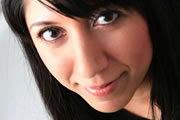Omid Djalili interview
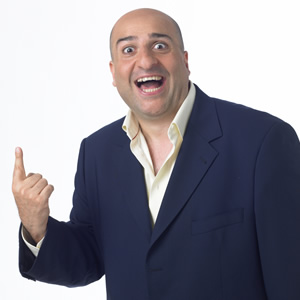
Back on tour after a three and a half year break away from the road, Omid Djalili is in reflective mood as he talks about how his comedy has evolved. He talks to Yasmeen Khan...
So firstly, why is your forthcoming tour called 'Tour of Duty'?
I was casting round for ideas and it was actually a guy on Twitter who came up with it. I liked the military connection to the phrase as it made me think of peace-keeping troops and I've always liked to think of my comedy as a contribution to peace of some kind. I also liked the idea of having a duty to get back out there on tour.
You're quoted in your press release saying you "teetered on the edge of oblivion"; what did you mean by that?
It meant that I was on the edge of no longer doing comedy - I didn't like what I was doing on stage. I guess I was coming to terms with myself - and in many ways I just didn't like it. Stand-up is my number one favourite thing and it's been three and a half years since I've really done any. People change and I've had such a big jump in my life and I'd like to think that the quality and the depth of what I do now is on a different level.
What sort of jump?
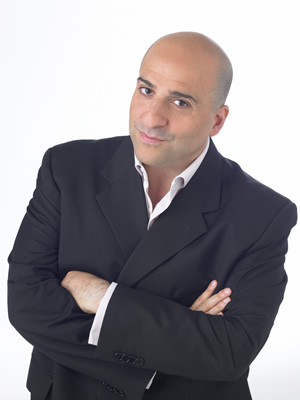
I've recently looked back at some old tapes of myself and I've been horrified at some of the material I've done and got away with. Some of it I think is rubbish, in fact it upsets me to watch it, and I think this is a reflection of the jump - or the evolution - I've had over the last three years. I've moved from a state of unconsciousness to consciousness as a performer and there is something very exciting about wanting to share that. I may well crash and burn, but it's all about the journey.
Was it the environments you were in over the last three years that made you change?
I think when you try and conquer different art forms - I've done musicals, TV ad campaigns, sitcoms - they are all very difficult and different art forms and it really makes you evolve. It's like spinning plates. It felt like the comedy one was the plate that was about to drop and I was really sad about it. But I'm back in love with it now - I'm watching a lot of comedy on YouTube. I like people like Doug Stanhope, Bill Bailey, Dara O'Briain - I find them all fascinating.
What's your writing process?
Well, I've been making a lot of notes and ideas on my iPhone for the last couple of years about why we are here; the purpose of life. Now it's a question of putting that into a stand-up comedy format. Before it was "here's some funny stuff", whereas now I'm doing comedy but making points. In some ways I'm going right back to my roots; it's what I used to do on stage. I find the point I want to make first, then make the joke, rather than the other way round.
There is a big difference between being a comedian and being a clown or being funny and having a voice. I think comics can be a real force of social change - if you look at the court jester, it was actually a very respected role - he wasn't just a funny man, it was to stop the king from from false pride. In this society where we have so much horrible stuff going on, we need that role more than ever - so the chance for comedians to bring about social change is still there, in fact it will never go away. But comics will always struggle with that issue: am I just a clown or can I use humour to make a point? But there are times when they become too serious and if they lose the laughs they lose their right to the artform.
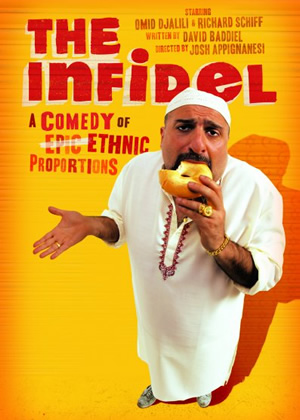
You sound like you're in quite a philosophical place...
I think I've always been a serious, philosophical person. But when I've watched myself on stage - this Tasmanian devil that comes out dancing and singing - I think it was that was down to insecurity. I was a good performer so I was just hiding behind performance. I think now I have more of a contribution to make. It's things like The Infidel [David Baddiel's film, in which Omid starred as a Muslim taxi driver who discovers he was born a Jew] that require a lot of thought - we agonised over every scene, what point we were making. It was a very philosophical way of working whereas stand-up comedy is just about 'be funny', which in many ways goes against the kind of person I am. Some of my friends have said to me, 'be less funny but put more thought behind it, more of you'. They felt uplifted by the performance yes, but they felt I was marginalising myself, not letting the audience see who I really am.
I love Bill Bailey and when I went to see him I came away feeling very uplifted, but he also had some great points to make. It's a more rounded way of experiencing a person, a more rounded entertainment I suppose.
Will you still do material about race and culture?
I think there will be a bit of that but I won't be as heavy as I have been before about it. I've realised that race is still in some ways a taboo subject in Britain but I think I have a fresh and better perspective now.
Do you get a sense of the audience's nervousness around culture and race?
Yes I do. But I also get a sense of a yearning for things that will affect them deeply - for example I did a show in Peckham in a community centre with a very lairy crowd. But as soon as I talked about anything of a higher nature, whether it was about why we are here or the nature of life, they were really drawn in, you could have heard a pin drop. As soon as you say something nourishing, people do respond. So yes, there is a nervousness around race - there is a thin line between playing with race and being racist and there's a thin line between making cheap laughs and making a point that is uplifting. It's about having the confidence to talk about those universal themes that affect us all.
Will you still do the belly dance on stage?
I don't know, there is a part of me that thinks that I will never do it again. But at the same time it was so funny and ridiculous that I may well do. People would come up to me in the street and go 'hey do the dance' and it was upsetting me, I thought 'is that what I've been reduced to' - because I knew that I had devised it just to cover any crap jokes. But in effect I was a very exposed and vulnerable man just dancing and the audience responded to that. I think I want to be more than a just a joyful entertainer with nothing to say. I'd love to get out there and make people laugh and also talk about the big questions in life.
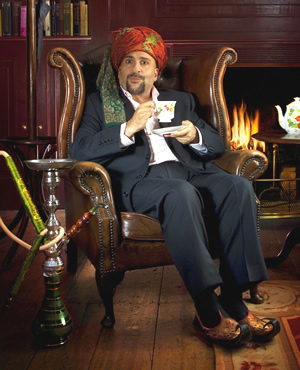
Let's be honest, you've gone up in the world in the last few years, you're now also a film star and a West End musical star, so now that you're back on the road, will your rider have changed?
When I was first on tour I used to hear this word 'rider' bandied around and I just pretended I knew what it meant, but I didn't have a clue. I think I just had that Middle Eastern humility - all I wanted a table and some water. But at the same time I do understand that we only have one life and you want to live it in quality and surround yourself with beauty and things that inspire you, so if you want nice things in your dressing room then why not, but I think I'll still be keeping things simple.
What else are you up to at the moment?
I've done a film with Ricky Grover called Bulla which is about the life of a nutty gangster. Also, The Paul Reiser Show, a US sitcom with Paul Reiser which has just started on NBC. It is in a Curb Your Enthusiasm style but without the swearing.
And finally, how was it to work with The Hutch (David Soul) who starred with in one of the Moneysupermarket adverts?
One good thing about this business is that you get to meet your heroes, and David Soul is wonderful man. We filmed those ads in South Africa and I had Jedward, John Prescott and David Soul back to back - a surreal trio. We filmed just after I'd come back from the US where I'd been working with Paul Reiser and done some work with Larry David - and all this in the year I also got to meet Robert De Niro - from De Niro to Jedward, what a year!
Help us publish more great content by becoming a BCG Supporter. You'll be backing our mission to champion, celebrate and promote British comedy in all its forms: past, present and future.
We understand times are tough, but if you believe in the power of laughter we'd be honoured to have you join us. Advertising doesn't cover our costs, so every single donation matters and is put to good use. Thank you.
Love comedy? Find out more
